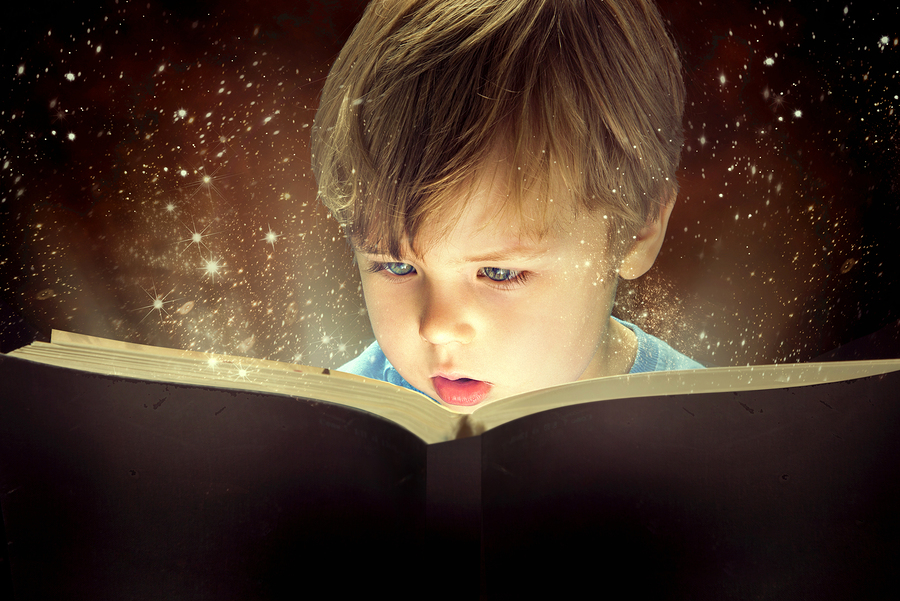As a child I would hear my mother and other adults use a secret code in my presence: for example, “I think we’ll stop for some i-c-e-c-r-e-a-m for the boys.” Again and again I heard that code: strange word gaps in a sentence replaced by short nonsense sounds that somehow made sense when linked together—made sense to adults anyway.
Books used the same code. I would look at the pictures, pointing to them in glee as a story I knew came back to me. Adults would stare at the marks spilled like pepper on a page and mysteriously repeat the story in the very same words I had heard before.
 “Mother, what’s this?” I pointed to one of the marks on the page. “That’s the word for dog. See the picture? D-o-g spells dog.” I asked that question over and over, pestering her as she ironed or washed the dishes or read the newspaper. With each answer I stored away another part of the code she revealed. Since we had no television, she read to my brother and me often, and I learned to follow along until I found a stored-away word.
“Mother, what’s this?” I pointed to one of the marks on the page. “That’s the word for dog. See the picture? D-o-g spells dog.” I asked that question over and over, pestering her as she ironed or washed the dishes or read the newspaper. With each answer I stored away another part of the code she revealed. Since we had no television, she read to my brother and me often, and I learned to follow along until I found a stored-away word.
I had to be careful. If I bothered her one too many times she got impatient—“Wait until you get to school! That’s their job.”—and refuse to tell me any more of the codes that day. I kept at it, wearing her down. I knew the mystery code was important because adults could unfold a dull grey newspaper, do nothing but move their eyes, and somehow know that it might snow the next day, or that the Russians had tested a new rocket. Or, Mother would open an envelope, study the sheets of paper inside, and tell us news from our Philadelphia relatives.
Then the great day arrived when I cracked the code. I had a few gold-colored 45-rpm records keyed to some of my favorite stories, such as Little Black Sambo, who melted the tiger into butter, and The Little Engine That Could, which made it all the way up the mountain. As the man with the scratchy voice read the story I knew by heart, I followed the black marks with my finger, lighting up when I hit a word I knew. At the end of the page, a dog named Nipper on the record barked, Arf Arf! and I turned the page. On that magical day I turned off the record player, and still I followed the story. I didn’t know all the words, but enough to get the meaning. As words shot from the page directly into my brain, a jolt like electricity made my skin prickle. I could read!
I began to play less and read more. “He has his nose in a book all the time,” Mother told her friends. I lounged on the porch on hot days, ignoring the insects that buzzed around and banged against the windows. I read hungrily, greedily, like one of those shrews in our garden that ate double its weight every day. The difference was, the shrew spent its life underground, while reading let me time-travel to England, or Africa, or Robinson Crusoe’s island, or wherever I was reading about. It set me free.
I loved animal books best of all: Old Yeller and The Yearling and The Black Stallion and a wonderful series about Freddy the Pig. “The smallest and cleverest” of the pigs on the farm, Freddy had the ability to talk to humans. In more than twenty books he worked as a detective, a newspaper editor, a magician, and a pilot, using his skills to defeat a gang of criminal rats. I also read a children’s book about a girl who stayed up all night and saw rats. I tried that, forcing myself out of the covers into the cold, hitting my head against the wall and pinching myself to stay awake. All I got for my efforts were red eyes the next morning. I saw no rats. Stories in books, I learned, were more interesting, more exciting than ordinary life.
 After reading Freddy and the Baseball Team from Mars, I found my all-time favorite sports book, The Kid Who Batted 1.000. Like me, this kid named Dave King was small and not-so-coordinated, and yet he had mastered the art of fouling off every pitch thrown to him. A scout learned about the kid, and signed him to the major leagues. He would come in as a pinch-hitter to frustrate the opposing pitcher, and after fouling off twenty or thirty pitches in a row he did just that, earning a walk to first base as the pitcher usually left with a sore arm. On the side, though, he secretly practiced hitting the ball fair, and in the World Series, with the championship on the line, Dave King lined a pitch down the left side so hard that it hit the foul pole and bounced into the seats fair, a walk-off home run. Ah, now I had a new hitting strategy.
After reading Freddy and the Baseball Team from Mars, I found my all-time favorite sports book, The Kid Who Batted 1.000. Like me, this kid named Dave King was small and not-so-coordinated, and yet he had mastered the art of fouling off every pitch thrown to him. A scout learned about the kid, and signed him to the major leagues. He would come in as a pinch-hitter to frustrate the opposing pitcher, and after fouling off twenty or thirty pitches in a row he did just that, earning a walk to first base as the pitcher usually left with a sore arm. On the side, though, he secretly practiced hitting the ball fair, and in the World Series, with the championship on the line, Dave King lined a pitch down the left side so hard that it hit the foul pole and bounced into the seats fair, a walk-off home run. Ah, now I had a new hitting strategy.
Jack London’s Call of the Wild and White Fang had more emotional impact on me at that age than Dickens or Shakespeare ever would. I could barely read through my tears as the wolfdog lay near death. I read the Bobbsey Twins series about a family with two sets of twins, one of them my age, and the Hardy Boys who worked as amateur detectives, and the Sugar Creek Gang about six Christian boys who mother said I ought to take after.
I worked hard to keep up with my older brother, who spent entire rainy weekends sampling the twenty-volume sets of the Book of Knowledge or The World Book Encyclopedia. He read every fiction book in his grammar school, then discovered science fiction. He challenged me to read at least a hundred books each summer. Much of literature went right over my head, or confused me. Schoolteachers boxed the ears of ornery students—I imagined a boxer in a crouch jabbing at an ear over and over, or a teacher smacking both ears at once with his hands, like cymbals. How do you gnash teeth? I wondered. I giggled over descriptions of a woman “doing her toilette.”

In a scene from the movie Black Robe, a Jesuit missionary tries to persuade a Huron chief to let him teach the tribe to read and write. The chief sees no benefit to this practice of scratching marks on paper until the Jesuit gives him a demonstration. “Tell me something I do not know,” he says. The chief thinks for a moment and replies, “My woman’s mother died in snow last winter.”
The Jesuit writes a sentence and walks a few yards over to his colleague, who glances at it and then hurries over to the chief and says, “Your mother-in-law died in a snowstorm?” The chief jumps back in alarm. He has just encountered the magical power of writing, which allows knowledge to leap across space, traveling in silence by way of symbols on a page.
For me, reading opened a chink of light that became a window to another world. I remember the impact of a book like To Kill A Mockingbird, which called into question the assumptions of my friends and neighbors in the South of the 1960s. Later, reading books like Black Like Me, The Autobiography of Malcolm X and Martin Luther King’s Letter from Birmingham City Jail, I felt my whole racist world shatter. Like the startled Huron chief, I too experienced the power that allowed one human mind to penetrate another with no intermediary but a piece of flattened wood pulp.
I especially came to value the freedom-enhancing aspect of writing. Speakers in the churches I attended could RAISE THEIR VOICES! and play emotions like musical instruments. But alone in my room, voting with every turn of the page, I met other representatives of the Kingdom—C. S. Lewis, G. K. Chesterton, Saint Augustine—whose calmer voices leapt across time to convince me that somewhere lived Christians who knew grace as well as law, love as well as judgment, reason as well as passion.

I became a writer, I believe, because of my own experience of the power of words. I saw that spoiled words, their original meaning wrung out, could be reclaimed. I saw that writing could penetrate into the crevices, bringing spiritual oxygen to people trapped in air-tight boxes. I saw that, when choosing to self-express for the sake of puny human beings, Almighty God forbade all graven images, relying instead on the Word. The Word manifests God’s image in the most freedom-enhancing way imaginable.
Writers, including those of us in the church, have at times used words more as clubs than levers. We have used words to control rather than liberate. Even so, somehow the written word has endured. I think of Irish monks laboring for weeks, even months, over single letters of illuminated manuscripts, keeping the word alive in an age when few people could read, or cared to. I think of men like William Tyndale, who gave their lives for the crime of making the Bible accessible to ordinary readers. I think of faithful writers like Alexander Solzhenitsyn and Denise Levertov who relied on the samizdat press to distribute hand-typed sheaves of witness from hand to hand.
These days, words seem thin and dull compared to the dazzle of virtual reality and hyper-linked multi-media websites. I have hope, though. Despite the waves of hysteria in church history, words of truth have survived and emerged later as living forces to change individuals and entire cultures. I have experienced their power. May we in the church always remember that words have their greatest impact when they enhance freedom, when they enlighten, and when they liberate. “The truth shall set you free,” said the Word made flesh.


Leave a Comment